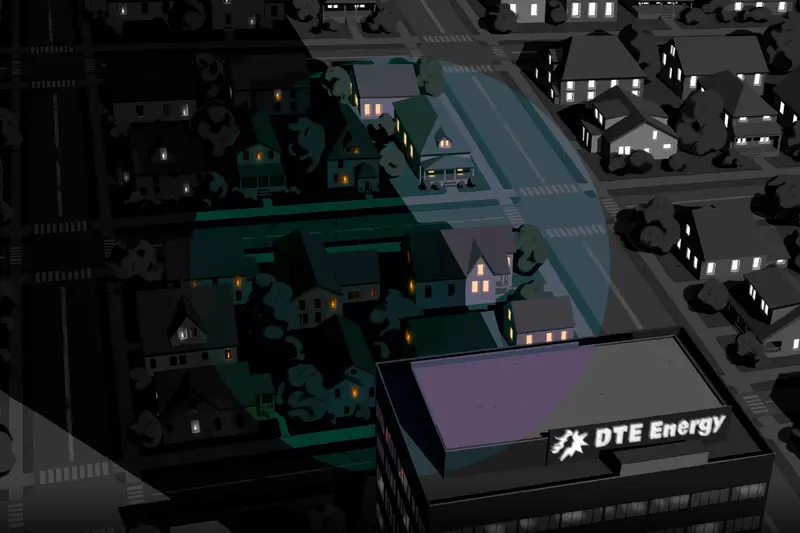This article was produced for ProPublica’s Local Reporting Network in partnership with Outlier Media. Sign up for Dispatches to get stories like this one as soon as they are published.
In response to reporting by Outlier Media and ProPublica showing how DTE Energy disconnected electric accounts for nonpayment during the COVID-19 pandemic, the Detroit City Council is calling for the power company to enact a one-year pause on electricity and gas shut-offs.
The resolution, passed at a City Council meeting on Tuesday, cites the findings of an Outlier-ProPublica story last month that analyzed disconnections in Michigan and found DTE shut off accounts 208,000 times between April 2020 and December 2021.
The investigation by the news organizations found that DTE’s rate of electricity shut-offs — disconnections as a proportion of customers — outpaced the six other utilities in Michigan that are owned by private investors and have their prices regulated by the state. Using federal data, the story also compared DTE’s electric rates with other similar utilities in the state. DTE’s residential rates were the second highest in Michigan.
The council began drafting a resolution a week after the investigation was published, and member Gabriela Santiago-Romero introduced it along with another colleague during the group’s most recent meeting. “She’s concerned about the prices of DTE rising and the burden that puts on residents of the city and of her district,” said Hank Kelley, a senior policy analyst for Santiago-Romero, who co-sponsored the resolution with council member Angela Whitfield Calloway.
Santiago-Romero tested positive for COVID-19 on Wednesday and was unavailable to talk.
“We’re still in a pandemic, evidenced by the fact that the council member was impacted just today,” Kelley said. “This impacts people’s ability to work and pay their bills.”
DTE has more than 2 million customers in its service area, which includes Detroit and covers most of Southeast Michigan. The company has told state regulators it has half a million customers living in poverty.
At the onset of the pandemic in 2020, DTE had the shortest moratorium on disconnections of any large utility in the state, three months. The council resolution asks DTE to voluntarily begin a new moratorium on shut-offs, “given the lasting economic impacts of the pandemic, thereby giving its customers some relief.”
The City Council sent its request for a moratorium to DTE executives and to its board of directors; the resolution also requested company leaders come before council to discuss the company’s rates.
Christopher Lamphear, manager of corporate communications for DTE, echoed the utility’s previous skepticism of moratoriums when asked about the council request. “Moratoriums are not always in the best interest of residents because they only allow debt to grow as energy use continues,” he said. “It is important to connect customers to the funds and assistance available, which DTE redoubled efforts to achieve when the pandemic began.”
Lamphear did not disclose how DTE will respond to the resolution. However, he said in an email that the city's Public Health and Safety Committee has invited DTE to provide a response at a future meeting.
He also said DTE is committed to its customers and has helped connect them to more than $100 million in assistance last year, while also forgiving $2.6 million in customer debt in 2020.
He said the City Council is expecting an official response from DTE when the two sides meet, but the timing was undecided.
The Michigan Public Service Commission, the state body responsible for regulating utility companies, also received a copy of the council resolution. The MPSC declined to comment on the resolution but a spokesman said, “The MPSC remains focused on affordability for utility customers and improving assistance programs available for low-income customers.”
DTE has asked the MPSC to allow the company to increase electric rates in order to raise an additional $388 million in annual revenue. The MPSC has until October to decide whether to approve the rate increase.
The MSPC has approved six rate increases for DTE since 2011. In each case, the commission gave DTE about half as much as it requested. DTE’s last rate increase was in the beginning of 2020; the utility said it delayed asking for a rate increase until this year because of the pandemic.
DTE’s residential rate, measured as the cost of electricity per kilowatt-hour, is the second highest among investor-owned utilities in Michigan, behind the Upper Peninsula Power Company, a utility with only about 50,000 customers in the northern part of the state. It is also higher than the price charged by the largest utility in each of the other Great Lakes states of Illinois, Indiana, Minnesota, Ohio and Wisconsin. DTE, however, points to monthly bills across the country and says those figures put it at or below the national average.
Michigan Attorney General Dana Nessel has intervened in the current rate case, with an eye toward the impact on consumers. “AG Nessel agrees that energy affordability is essential and has been working hard at reducing or eliminating rate increase requests through advocacy before the MPSC,” her press secretary, Lynsey Mukomel, said.
As for shut-offs for nonpayment, Mukomel said Nessel’s office “is investigating these issues in DTE’s current electric rate case, which allows the office to conduct discovery on these very issues.”

















